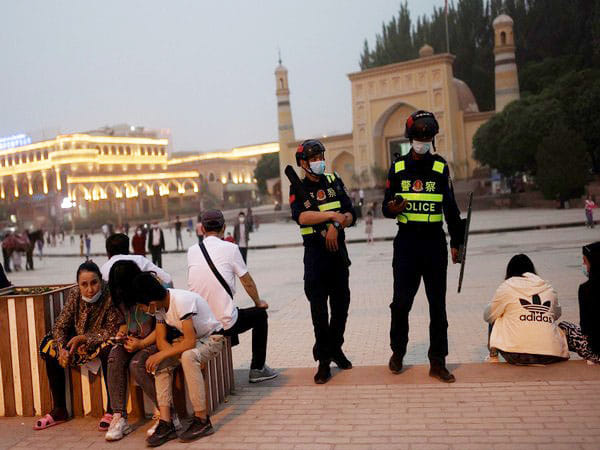Beijing [China], May 3 (ANI): In order to negate charges of Uyghur genocide, China has enlisted vloggers – travel videos recorded by video bloggers- to whitewash Uyghur minorities’ situation in Xinjiang.
Bahram Sintash and Nuriman Abdureshid, writing in Radio Free Asia (RFA), said that China has enlisted young foreign social media influencers who produce short videos showing happy minorities in the far-western region as part of Beijing’s massive propaganda effort to depict Uyghurs as content with and grateful for Chinese rule.
The videos show “foreign travellers” interviewing people in factories in Xinjiang, with captions such as “Friends, it’s a lie that there is a genocide of the Uyghurs.” “Everything is normal here,” and “Is there a single piece of evidence that there are more than 1 million people in concentration camps?”
Business Insider reported in January that China’s consulate general in New York signed a USD 300 million contract with US-based Vippi Media in New Jersey to create a social media campaign promoting positive messaging about China TikTok, Instagram, and Twitch as a lead-up to the 2022 Olympic Games in Beijing.
Social media influencers were asked to produce content for their target audiences on Chinese culture, positive diplomatic relations between China and the US, and consulate general news, reported RFA.
State-owned media outlets and local governments organize the pro-China campaign, paying vloggers to take trips, according to documents posted online and video producers familiar with the system.
“What happens is you’ll have a state media like CGTN or CRI or iChongqing or any number of organizations which are run by the Chinese government — which are the Chinese government — and what they will do is they will pay for the flights, pay for the accommodation, organize the trip, and liaise with the content creator and invite them to go on these trips,” said YouTuber Winston Sterzel, who lived in Xinjiang.
Minders working as translators or fixers are always present to make sure the content creators follow the script, he said.
Vloggers, who post short videos on their personal websites or social media account on platforms like YouTube, say that local government officials arrange their travel and logging during trips they are hired for to make videos that put China in a good light, said Bahram and Nuriman.
“They arrange our travel, and they pay for our lodging and food,” said YouTuber Lee Barrett in a video he recorded.
China’s struggle to shape world opinion about Xinjiang will come into sharp focus this month, when UN human rights chief Michelle Bachelet makes a long-awaited visit to China, including Xinjiang.
Since 2017, about 1.8 million Uyghurs and other Turkic peoples are believed to have been incarcerated in a vast network of internment camps in Xinjiang.
The US and a handful of European countries have labelled these practices genocide, while China has angrily rejected the criticism and maintains the camps are vocational training centres designed to combat religious extremism and terrorism.
In fall 2021, the Xinjiang Uyghur Autonomous Region (XUAR) government began an initiative to mobilize foreign students in China to praise “Xinjiang policy.” The effort was part of the central government’s larger plan to portray ethnic minorities in Xinjiang as happy and content, according to an article in Xinjiang Daily.
Under the title “The people of all ethnic groups in Xinjiang are living happily and joyfully,” the report cited a series of letters written by Chinese Communist Party General Secretary Xi Jinping in which he called on foreign students in July 2021 to increase their understanding of the “real China,” so that their knowledge would inspire others to understand the country as well.
The XUAR government in October 2021 sponsored a trip to Xinjiang for students from 16 countries, including Bangladesh, Afghanistan, Burundi, Uganda, Russia, Pakistan, Korea, Mongolia, Sri Lanka, the US and the UK, said Bahram and Nuriman.
Meanwhile, since the start of 2018, authorities have prevented most international journalists from entering Xinjiang and forced foreigners living in the region to leave.
YouTubers from the US and South Africa who lived in the Xinjiang or in mainland China for a decade or more said that while recent vlogs by foreigners “travelling” to Xinjiang appear to be simple and normal, government fixers are always on the other side of the camera, controlling what is said and recorded.
Josh Summers, who ran a popular blog known as “Far West China” as well as a YouTube channel, moved to Xinjiang’s capital Urumqi (Wulumuqi) in 2006 and lived both there and in Karamay (Kelamayi) until 2018. While in Urumqi (Wulumuqi), he wrote about and produced videos on Uyghur weddings, cuisine and Eid prayers at the Id Kah Mosque in Kashgar.
“A lot of these travellers that you’re talking about, these people that are doing videos, the reality is they know nothing on Xinjiang,” he said. “They pretend to, but they know nothing, whereas I lived there.”
Summers said he was detained and questioned by authorities. While they eventually let him go, they also told him and his family that they could no longer stay in China.
American Matthew Tye and South African Winston Sterzel were also forced to leave China over videos they published after having lived in the country for more than 10 years.
The pair, who became well known in China under the handles laowhy86 and Serpentza, told RFA that vloggers’ videos, may appear to have been made freely, but they are fake and have another purpose altogether. (ANI)
This report is auto-generated from ANI news service. ThePrint holds no responsibility for its content.






